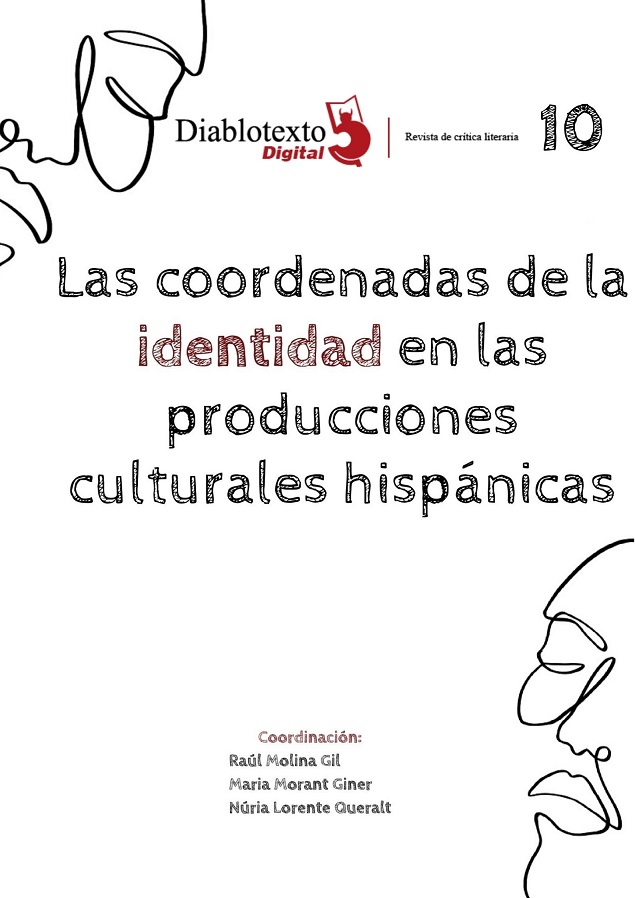THE CONSTRUCTION OF FEMALE IDENTITY IN THREE MEMOIRS OF SPANISH EXILE (DOBLE ESPLENDOR, MEMORIAS DE UNA MUJER SIN PIANO AND ANTES QUE SEA TARDE)
DOI:
https://doi.org/10.7203/diablotexto.10.21663Keywords:
Constancia de la Mora, Jeanne Rucar, Carmen Parga, Spanish Republican exile, autobiography and female identity Abstract
Abstract
Constancia de la Mora, Jeanne Rucar and Carmen Parga wrote their memoirs during the Spanish Republican exile. In this study we show how these women use the model of confessional literature with a “therapeutic” purpose that includes the intimate need to configure a discourse of affirmation, justification and personal reconstruction. Thus, based on a conception of memoir literature as a reparative process of the self and taking as the theoretical backbone of our analysis the relationship between autobiographical discourse and the construction of female identity, we mainly analyse the figure of the narrative subject in order to address the link between gender, memory and self-representation.
 Downloads
Downloads
 References
References
Álvarez Calleja, María Antonia (1989). “La autobiografía y sus géneros afines”, Epos: Revista de filología, n.º 5, pp. 439-450. En <http://revistas.uned.es/index.php/EPOS/article/view/9637/9183> [Fecha de consulta: 3 de enero de 2020].
Burin, Mabel; Dio Bleichmar, Emilce [1996] (1999). Género, psicoanálisis, subjetividad. Buenos Aires: Paidós, Psicología Profunda.
Caballé, Anna (1998). “Memorias y autobiografías escritas por mujeres (siglos XIX y XX)”. En Iris M. Zavala (coord.), Breve historia feminista de la literatura española (en lengua castellana), Vol. 5: La literatura escrita por mujeres: desde el siglo XIX hasta la actualidad. Barcelona: Anthropos, pp. 111-138.
Caballé, Anna (2001). “El memorialismo en la literatura española contemporánea”. En AA.VV., Literatura y memoria, Actas del congreso: un recuento de la literatura memorialística española en el último medio siglo. Jerez de la Frontera: Fundación Caballero Bonald, pp. 143-153.
Caballé, Anna (2012). “Malestar y autobiografía”. Cuadernos Hispanoamericanos, 745/746, pp. 143-153. En <http://www.cervantesvirtual.com/obra/malestar-y-autobiografia/>[Fecha de consulta: 17 de junio de 2021].
Capdevila-argüelles, Nuria (2011). “Autobiografía y autoría de mujer en el exilio”. Journal of Iberian and Latin American Research, 17, 1, pp. Pp. 5-16. En <https://ore.exeter.ac.uk/repository/handle/10871/9282> [Fecha de consulta: 14 de junio de 2021].
Fabra, María Luisa (1968). “La virtud”. En AA.VV., La mujer en España. Madrid: Ediciones de Cultura Popular, pp. 73-98.
Fernández Fraile, María Eugenia (2008). “Historia de las mujeres en España: historia de una conquista”. La Aljaba. Segunda Época: revista de estudios de la mujer, XII, pp. 11-20. En <http://www.cervantesvirtual.com/obra/historia-de-las-mujeres-en-espana-historia-de-una-conquista-927357/> [Fecha de consulta: 23 de mayo de 2021].
Flax, Jane (1995). Psicoanálisis y feminismo. Pensamientos fragmentarios. Madrid: Cátedra, Feminismos.
Fox Maura, Soledad (2017). Connie. Biografía de Constancia de la Mora. Sevilla: Renacimiento.
Gómez-Ferrer, Guadalupe (2004), “Hacia una redefinición de la identidad femenina: las primeras décadas del siglo XX”. Cuadernos de historia contemporánea, 26, pp. 9-12. En <https://dialnet.unirioja.es/servlet/articulo?codigo=1075576> [Fecha de consulta: 13 de febrero de 2021].
Heilbrun, Carolyn G. (1994). Escribir la vida de una mujer. Madrid: MEGAZUL.
Jelin, Elizabeth (2002). “El género en las memorias”. En <http://www.lazoblanco.org/wp-content/uploads/2013/08manual/bibliog/material_masculinidades_0425.pdf> [Consulta: 13 de julio de 2021].
Lejeune, Philippe [1975] (1994). El pacto autobiográfico. Madrid: MEGAZUL, La Autobiografía.
Mora y Maura, Constancia de la [1944] (2004). Doble esplendor. Barcelona: Gadir Editorial.
Parga, Carmen [1996] (2020). Antes que sea tarde. Sevilla: Renacimiento.
Puertas Moya, Francisco Ernesto (2004). Aproximación semiótica a los rasgos generales de la escritura autobiográfica. Logroño: Universidad de la Rioja.
Pozuelo Yvancos, José María (2006). De la autobiografía. Teoría y estilos. Barcelona: Crítica.
Rucar, Jeanne [1990] (2016). Memorias de una mujer sin piano. Barcelona: Cabaret Voltaire.
Saiz Cerreda, M.ª Pilar (2012). “Identidad y representación en el discurso autobiográfico”. Rilce, 28, 1, pp. 8-17. En <https://dadun.unav.edu/bitstream/10171/29244/1/Rilce_28-1.pdf> [Fecha de consulta: 26 de junio 2021].
Scarano, Laura (1997). “El sujeto autobiográfico y su diáspora: protocolos de lectura”. En Francisco Sevilla y Carlos Alvar (coord.), Actas del XIII Congreso de la Asociación Internacional de Hispanistas. Tomo III. Barcelona: Castalia, pp. 692-697. En <https://cvc.cervantes.es/Literatura/aih/pdf/13/aih_13_3_089.pdf> [Fecha de consulta: 27 de abril de 2021].
Downloads
Published
How to Cite
-
Abstract516
-
PDF (Español)393
Issue
Section
License
Licencia de reconocimiento de Creative Commons “Reconocimiento - No Comercia l- Sin Obra Derivada
Authors who publish with this journal agree to the following items:
The authors will keep their copyright and guarantee the journal the right of first publication of their work, which will be simultaneously subject to the Creative Commons license that allows third parties to share the work indicating its author and its first publication in the journal. The authors may adopt other non-exclusive license agreements to distribute the version of the published work (e.g., depositing it in an institutional telematic file or publishing it in a monographic volume), with an acknowledgment of its initial publication in this journal. The authors are allowed and encouraged to disseminate their work through the Internet (e.g., in institutional telematic archives or on their website) before and during the submission process, which can produce interesting exchanges and increase citations of the published work. (See Effect of Open Access)




